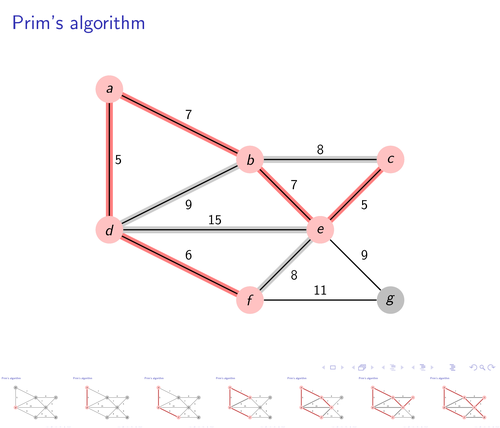A step by step example of the Prim's algorithm for finding the minimum spanning tree. Animated using Beamer overlays.
Source: Adapted from an example on Wikipedia
Edit and compile if you like:
\documentclass{beamer}
\usepackage{tikz}
\usetikzlibrary{arrows,shapes}
\begin{document}
% Declare layers
\pgfdeclarelayer{background}
\pgfsetlayers{background,main}
\begin{frame}
\frametitle{Prim's algorithm}
%% Adjacency matrix of graph
%% \ a b c d e f g
%% a x 7 5
%% b 7 x 8 9 7
%% c 8 x 5
%% d 5 9 x 15 6
%% e 7 5 15 x 8 9
%% f 6 8 x 11
%% g 9 11 x
\tikzstyle{vertex}=[circle,fill=black!25,minimum size=20pt,inner sep=0pt]
\tikzstyle{selected vertex} = [vertex, fill=red!24]
\tikzstyle{edge} = [draw,thick,-]
\tikzstyle{weight} = [font=\small]
\tikzstyle{selected edge} = [draw,line width=5pt,-,red!50]
\tikzstyle{ignored edge} = [draw,line width=5pt,-,black!20]
\begin{figure}
\begin{tikzpicture}[scale=1.8, auto,swap]
% Draw a 7,11 network
% First we draw the vertices
\foreach \pos/\name in {{(0,2)/a}, {(2,1)/b}, {(4,1)/c},
{(0,0)/d}, {(3,0)/e}, {(2,-1)/f}, {(4,-1)/g}}
\node[vertex] (\name) at \pos {$\name$};
% Connect vertices with edges and draw weights
\foreach \source/ \dest /\weight in {b/a/7, c/b/8,d/a/5,d/b/9,
e/b/7, e/c/5,e/d/15,
f/d/6,f/e/8,
g/e/9,g/f/11}
\path[edge] (\source) -- node[weight] {$\weight$} (\dest);
% Start animating the vertex and edge selection.
\foreach \vertex / \fr in {d/1,a/2,f/3,b/4,e/5,c/6,g/7}
\path<\fr-> node[selected vertex] at (\vertex) {$\vertex$};
% For convenience we use a background layer to highlight edges
% This way we don't have to worry about the highlighting covering
% weight labels.
\begin{pgfonlayer}{background}
\pause
\foreach \source / \dest in {d/a,d/f,a/b,b/e,e/c,e/g}
\path<+->[selected edge] (\source.center) -- (\dest.center);
\foreach \source / \dest / \fr in {d/b/4,d/e/5,e/f/5,b/c/6,f/g/7}
\path<\fr->[ignored edge] (\source.center) -- (\dest.center);
\end{pgfonlayer}
\end{tikzpicture}
\end{figure}
\end{frame}
\end{document}Click to download: prims-algorithm.tex • prims-algorithm.pdf
Open in Overleaf: prims-algorithm.tex